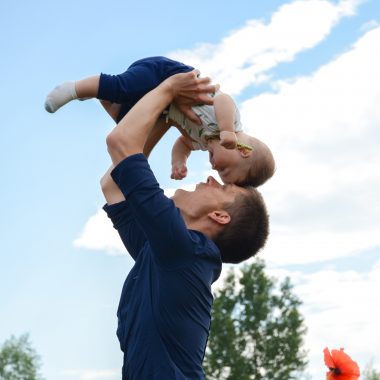Bonding is that magical connection that forms between parents and their babies. While it comes naturally for mothers and babies, fathers may need to work a bit harder to establish a deep bond with their little ones.
Did you know that a baby’s brain grows faster from the beginning of pregnancy to three years of age than at any other stage in their life? This is why experts call this period the “critical period” of development, as it lays the foundation for lifelong positive outcomes.
Your child’s daily experiences, as well as your actions, shape their brain development and cognitive abilities. Positive experiences foster healthy brain development and support future learning, social skills, and resilience to stress. That’s why both parents need to be actively involved in their baby’s life.
While we know a lot about mother-infant bonding, we still have much to learn about how fathers can form a strong connection with their babies. If you want to learn more about father and baby bonding and how to establish a secure, early bond, keep reading!
How long does it take a father to bond with his baby?
So, how long does it take for a father to bond with his baby? Well, while pregnancy, birth, and breastfeeding may give mothers a head start in bonding, new generations of fathers are becoming increasingly involved in childcare.
Some fathers may feel a strong bond with their baby right from the start of the pregnancy, while others may take a bit longer. Bonding is a process, and it’s normal for fathers to need some time to get to know their infants and figure out the best ways to interact with them.
One way fathers can develop a bond with their baby is by communicating, caring, and playing. As the baby grows and develops, a two-way relationship will start to blossom between the father and the baby. This typically takes around six months.
In order to promote father and infant bonding, it’s helpful to understand how babies bond. For example,
- Babies respond well to skin-to-skin contact, which can be soothing for both the baby and the parent while promoting growth and development.
- Eye-to-eye contact is another powerful way of communication that babies prefer
- Babies also love to vocalize and imitate their parent’s facial expressions and gestures as part of their early communication efforts.
Benefits of father and infant bonding
Research has consistently shown that active father involvement during infancy leads to a host of benefits for both the child and the father. Studies indicate that infants with involved fathers are more secure, confident, independent, and curious about the world around them.
Other studies have found that toddlers whose fathers were involved in their childcare were ahead of schedule by two to six months in terms of development, problem-solving skills, and social skills.
The benefits of father and infant bonding are numerous. For example:
- Playing with your child from the start can significantly boost their physical and mental development.
- Spending quality time with your newborn can reduce stress and increase confidence in fathers.
- Strong father-baby bonds can help counter issues such as depression later in life.
- Men who had a positive relationship with their fathers during childhood are better equipped to handle stress.
- Babies whose fathers are actively involved in their care from birth are more likely to be emotionally secure.
- Children who spend quality time with their fathers are less likely to engage in crime or abuse drugs and alcohol later in life.
- Strong relationships with fathers can help children have better social connections and achieve academic success.
- Children who engage in playful, physical activities with their fathers learn to regulate their emotions.
Overall, active father involvement is crucial for the healthy development and well-being of children. Taking the time to bond with your baby and be an involved parent will pay off in countless ways for you and your child.
How can a father bond with his baby before birth?
Although fathers can’t carry their babies during pregnancy, the bonding process can begin during this time and continue to grow once the baby arrives.
Here are some ways that new fathers can start bonding with their baby during pregnancy:
Attend your partner’s prenatal appointments
Attending your partner’s doctor appointments is a great way to feel more connected during pregnancy.
Hearing your baby’s heartbeat, getting updates on their development, and asking questions about the process can help you bond with your little one and your partner.
Talk, sing, and read to your baby
Did you know that babies in the womb can recognize their father’s voice before they are born? It’s true!
Studies have shown that if fathers talk to their unborn babies on a regular basis, the babies may start recognizing their father’s voice as early as the second trimester. Talking, singing, and reading to your baby in the womb can improve your baby’s recognition of your voice and help you bond with them.
Touch your partner’s belly
We know that a baby in the womb is conscious of being loved. Placing a hand on the mother’s belly to feel the baby’s movements can help fathers establish a physical connection with their baby. This can also be a special moment for the couple to share together.
Talk to your partner and care for her
In the journey of becoming parents, the relationship and communication between the parents play a vital role in the baby’s development through pregnancy and beyond. It is also important for building a strong bond with your baby.
As a father-to-be, it’s essential to get involved in the pregnancy period by talking to your partner about your dreams, hopes, and plans for the baby. Research suggests that the parents’ romantic relationship before the baby is born may facilitate father-child bonding.
When caring for your pregnant partner, you are also caring for your baby. Ensuring your partner is comfortable and happy has a positive impact on the baby. Here are some ways you can show your care and support:
- Ask your partner how you can help her. Even small tasks like getting her water or snacks can make a big difference.
- Offer to take on some new responsibilities. This can be as simple as doing the laundry or grocery shopping.
- Plan a date night. This is an excellent way to spend quality time together and strengthen your relationship.
- If you have other children, offer to take over parenting duties for the day. This gives your partner a chance to rest and take some time for herself.
Keep a diary
Writing in a diary can be a powerful tool for improving your well-being and building a stronger connection with your baby. It’s a safe space to reflect on your thoughts, hopes, and dreams.
By recording daily events and your feelings about your baby, you can gain a deeper understanding of yourself and your emotions. This can help you feel more connected to your baby and develop a stronger bond with them.
Take some time each day to sit down with your diary and write about your experiences. It doesn’t have to be a long entry, just a few sentences can be enough. This simple habit can have a big impact on your mental health and your relationship with your child.
Tips for father-baby bonding
Bonding promotes the infant’s attachment to the parent and has been associated with various positive developmental outcomes later in life.
The quality and quantity of parent-infant interaction greatly influence bonding. Below are some ways for dads to bond with their babies.
Start early
Did you know your baby can hear you from as early as 18 weeks in the womb? It’s never too early to start building a strong bond with your little one. Take a few minutes each day to speak, sing, or read to your baby in the womb.
Share your hopes and dreams with them, and let them know they’re loved. These simple actions can make a big difference in fostering a deep connection between you and your baby after they’re born.
Skin-to-skin contact
Skin-to-skin contact is an incredible way to bond with your baby. Studies have shown that cuddling, carrying, and even changing your little one can help create the necessary skin-to-skin connection they need to feel secure and loved.
When you hold your baby close to your chest, they can hear your heartbeat and get familiar with your unique scent, just like they did in the womb. So, take advantage of every chance you get to snuggle up with your little one.
It’s a beautiful way to feel close to your baby and can also help you both relax. Don’t underestimate the power of skin-to-skin contact in building a strong bond between you and your new baby.
Baby Massage
Baby massage is an excellent way for fathers to bond with their little ones. Massaging your baby’s face, scalp, and body can help dads get in tune with their babies’ needs and create a lasting sense of closeness.
Not only does baby massage release the happy hormone oxytocin for both the father and the baby, but recent studies have also shown that it can be an effective way to combat the baby blues.
So, if you’re a dad looking to strengthen your bond with your baby, consider incorporating baby massage into your daily routine. It’s a simple yet powerful way to connect with your little one and support your emotional well-being.
Being Present
For fathers, being present during the first year of their baby’s life is crucial in building a strong bond. Spending quality time with your little one creates a sense of security that can last a lifetime.
Play With Baby
Around six months old, babies are developmentally ready for playtime, which can be a great opportunity for fathers to bond with their little ones. Playing together stimulates the parent-child relationship and helps build a positive attachment between the parent and child.
Activities like aeroplaning around the room, bouncing baby up and down, and lots of tickling are fun and engaging ways to bond with your baby. But playing isn’t just about having fun. It’s also critical to your baby’s physical and social development, building mental resilience, physical coordination, and social skills.
Father-Child Traditions
Bedtime stories, singing lullabies, baby-naming ceremonies, and other traditions can be a special time for fathers to bond with their babies.
Following traditions helps build a strong relationship between the father and child, creating a sense of security and belonging within the family.
Reading to Baby
Reading to your baby is an excellent way to promote bonding, language development, and a sense of security. Making reading a part of your bedtime routine can be especially effective in fostering this connection between parent and child.
As you read to your baby, they will hear the soothing sound of your voice and feel comforted and secure in your presence. Additionally, reading aloud exposes babies to new words, sounds, and concepts, which can help promote their language development.
What are some early bonding activities for fathers?
Father-child bonding is crucial for the well-being of the child. Here you can find some simple ways that promote bonding with the baby.
Early bonding activities include:
- Participating in labor and delivery
- Feeding (breast or bottle); sometimes, dads form a special bond with their baby when handling a middle-of-the-night feeding and diaper change
- Reading to your baby
- Singing to your baby
- Giving your baby a bath
- Mirroring your baby’s movements
- Mimicking your baby’s cooing and other vocalizations
- Using a front baby carrier during routine activities
How can a new father understand his newborn’s bonding behavior?
An infant uses body language to express their desire to connect with you.
For example, your infant might
- smile at you
- make eye contact
- make little noises, like coos or laughs.
- look relaxed and interested
Father-child bonding is crucial to a child’s early development and overall well-being. Whether you’re a new father or an experienced one, remember that your presence and engagement in your child’s life are essential for their growth and development.
References: parents.com, askdrsears.com, webmd.com, nct.org.uk, wfmchealth.org, news.umich.edu, raisingchildren.net.au










